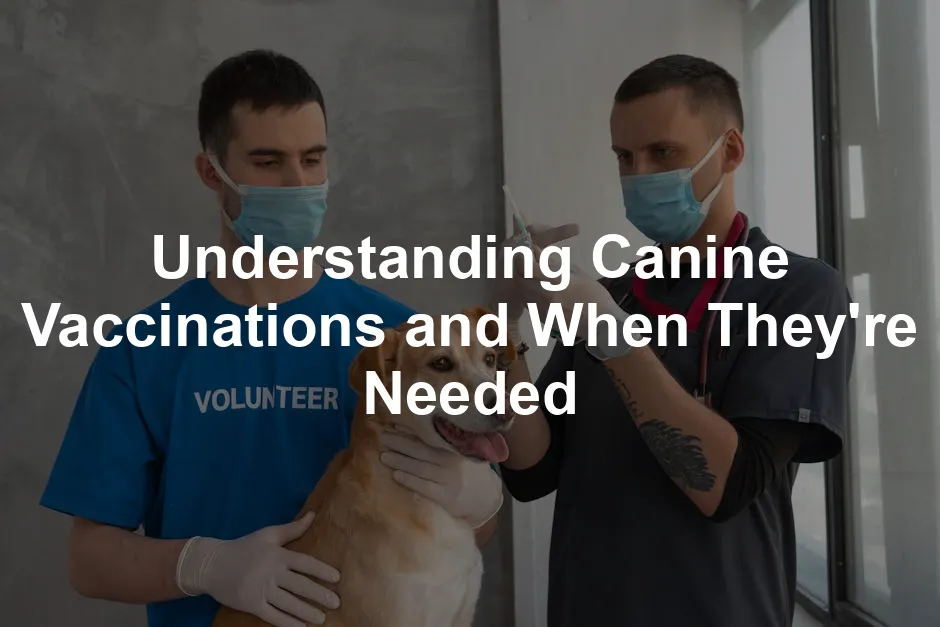Introduction
Let’s get one thing straight: no pup enjoys a trip to the vet. Needles? Yikes! But here’s the deal—those little pokes are essential. Canine vaccinations are like superhero capes for our furry friends, protecting them from a slew of nasty diseases. With modern medicine, many threats that once plagued dogs are now preventable.
Vaccinations save lives. They shield against severe illnesses like rabies and parvovirus that can cause unimaginable suffering. Yet, many pet owners have concerns. “Will my dog feel sick after a shot?” or “Isn’t it better for them to build immunity naturally?” These misconceptions can lead to dangerous choices.
Let’s unpack the importance of vaccinations, clear up the confusion, and ensure your canine companion stays happy and healthy!
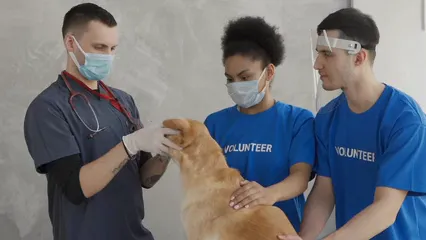
Why Do Dogs Need Vaccines?
The Role of Vaccines: Vaccines are like a dress rehearsal for your dog’s immune system. They introduce a harmless version of a virus or bacteria, training your pup’s body to recognize and combat the real deal. That way, if a disease comes knocking, their immune system is ready for battle.
Consequences of Not Vaccinating: Skipping vaccinations can have dire consequences. Unvaccinated dogs are like open invitations for diseases. Canine parvovirus, for instance, is a nasty virus that can lead to severe vomiting and diarrhea, often resulting in death. Rabies is another serious threat, which is not just dangerous for dogs but also poses a risk to humans.
Public Health Considerations: Vaccination isn’t just about protecting your pet; it’s also about community health. Diseases like rabies can spread from animals to humans, creating public health crises. By vaccinating our dogs, we contribute to a safer environment for everyone. So, when you think about vaccinations, remember: it’s not just a personal choice; it’s a collective responsibility.
In a nutshell, vaccines are essential for your dog’s health and well-being. They prevent serious diseases, protect public health, and ensure your furry friend lives a long, vibrant life. Plus, who doesn’t want to avoid those hefty vet bills that come with treating preventable diseases? It’s a win-win!
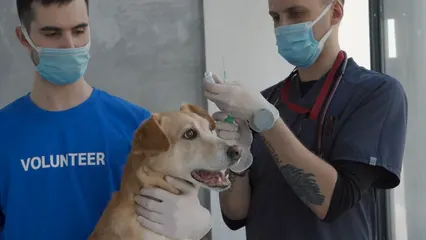
Core Vaccines Every Dog Needs
Definition of Core Vaccines
Core vaccines are essential immunizations for all dogs, regardless of lifestyle. They protect against diseases that are severe, contagious, and often fatal. Think of them as the VIPs of the vaccination world! These vaccines are recommended by experts because they help ensure that your pup stays healthy and that our furry friends contribute to a safer canine community. By vaccinating, you’re not just protecting your own dog; you’re looking out for the entire pack!
List of Core Vaccines
- Canine Distemper
Canine distemper is a viral disease that wreaks havoc on a dog’s respiratory, gastrointestinal, and nervous systems. Symptoms can include fever, coughing, vomiting, and seizures. Sadly, this disease can be fatal, especially in young puppies. With the right vaccination, you can help your dog dodge this nasty bullet! - Canine Parvovirus
Parvovirus is a highly contagious virus that primarily affects puppies and unvaccinated dogs. It causes severe gastrointestinal distress like vomiting and diarrhea, which can lead to dehydration and even death if untreated. This little monster spreads like wildfire in places where dogs congregate, so it’s best to keep your pup protected with timely vaccinations. - Canine Adenovirus
This virus is responsible for two main conditions: hepatitis and respiratory illnesses. Canine adenovirus type 1 leads to infectious canine hepatitis, which can cause liver damage, while type 2 is associated with respiratory infections. Both can be serious! Luckily, a simple shot can help fend off these threats. - Rabies
Rabies is a viral disease that affects the brain and is universally fatal. It’s not just a dog problem; it’s a public health concern. In many places, rabies vaccination is legally required. It’s a crucial step in protecting both your dog and the humans they interact with. So, when in doubt, get that rabies shot!
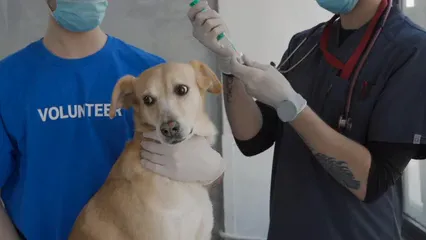
Vaccination Schedule for Core Vaccines
When it comes to getting these core vaccines, timing is everything! Puppies typically start their vaccination journey at 6 to 8 weeks of age. They’ll receive a series of shots every few weeks until they are about 16 weeks old. After that, a booster is given at around one year, followed by revaccination every three years for most core vaccines. It’s essential to stick to this schedule to ensure your furry friend develops strong immunity against these potentially deadly diseases. Always consult with your veterinarian to tailor a vaccination plan that’s right for your pup’s needs!
And speaking of planning, every dog owner should consider having a Dog Vaccination Schedule Calendar to keep track of all those important dates. Trust me, your future self (and your pup) will thank you for it!
Non-Core Vaccines: Understanding Their Importance
Lyme Disease
Ticks are the sneaky little ninjas of the animal kingdom. They lurk in tall grass, waiting for their next victim. Unfortunately, they can cause Lyme disease in dogs. This sneaky illness can lead to joint pain, fever, and fatigue. And trust me, no one wants a lethargic pup who’d rather lounge than chase squirrels.
So, what can you do? First, keep your dog tick-free! Regularly check your furry friend for ticks after walks, especially in wooded areas. Use tick preventatives recommended by your vet. If you live in a tick-heavy area, consider the Dog Flea and Tick Prevention Collars. It’s an extra layer of protection to keep your dog bouncy and happy.

Canine Influenza
If your dog is the social butterfly of the canine world, the canine influenza vaccine is a must. This virus spreads like wildfire in places where dogs gather—think dog parks, boarding facilities, or grooming salons. Just like that friend who catches a cold and shares it with the whole group, canine influenza can make its rounds quickly.
Symptoms include coughing, fever, and lethargy. While many dogs recover, some may develop severe respiratory issues. A simple vaccine can shield your pup from this illness. So, if your dog enjoys group playdates, this vaccine is more than a good idea; it’s essential!

When to Consider Non-Core Vaccines
Not every dog needs every vaccine. When assessing the need for non-core vaccines, consider your dog’s lifestyle and environment. Does your pup frequent dog parks or play with other dogs often? If so, vaccines for kennel cough or canine influenza may be wise.
If you live in an area known for tick problems, consider Lyme disease vaccination. On the flip side, if your dog is a homebody, they may not need every non-core vaccine out there. Always consult your vet for tailored advice. Each dog is unique, and their vaccination needs should be too!
Non-core vaccines are not one-size-fits-all. They should complement your dog’s daily adventures, ensuring they lead a healthy, active life without unnecessary risks. The right vaccination plan can keep your dog romping through life, enjoying every moment with you!

Possible Side Effects and Myths About Vaccinations
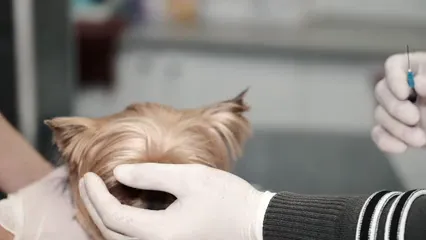
Common Side Effects
When your dog gets vaccinated, it’s not all tail wags and happy barks. Some pups might experience mild side effects. These can include tenderness at the injection site, slight swelling, or a temporary dip in energy. Imagine your dog feeling a bit “blah” for a day or two—it’s often nothing to worry about!
However, keep your eyes peeled for more severe reactions. Although rare, signs like difficulty breathing, vomiting, or swelling in the face can occur. If you notice any of these symptoms, it’s time to call your vet faster than your dog can chase a squirrel. Remember, while vaccinations save lives, it’s essential to monitor your furry friend after their shots.

Addressing Common Myths
Now, let’s tackle some common myths swirling around like a dog chasing its tail.
Myth 1: Vaccination Causes Illness.
Some pet owners worry that vaccines can make their dogs sick. While side effects can occur, serious illnesses are incredibly rare when vaccinations are done correctly. It’s much safer than letting your dog face a disease that could be life-threatening!
Myth 2: Indoor Dogs Don’t Need Vaccinations.
Just because your pup prefers cuddling on the couch doesn’t mean they’re safe from diseases. Indoor dogs can still be exposed to various pathogens, especially if you bring them in from outside. Plus, even a trip to the vet can introduce them to potential threats. So, don’t skip those shots just because your dog is more of a homebody than a social butterfly.
Myth 3: Over-Vaccination Concerns.
Many pet owners fear they’re overloading their dogs’ immune systems. The truth? Modern vaccines are designed to be safe and effective. Your vet tailors the vaccination schedule to your dog’s specific needs, ensuring they get only what they require. Trust your veterinarian—they’re your dog’s best ally in health!
In short, vaccinations are a crucial part of keeping your dog healthy. By understanding potential side effects and debunking myths, you’ll make informed decisions about your furry friend’s health. Stay proactive, and your pup will thank you with endless tail wags!

Reliable Resources
When it comes to canine vaccinations, you want to ensure your information comes from reputable sources. After all, misinformation can lead to some pretty hairy situations for our furry friends. Here are two trusted organizations that provide valuable insights and guidelines on vaccinations:
- American Veterinary Medical Association (AVMA): The AVMA is like the superhero of veterinary medicine. They provide detailed resources on the importance of vaccinations, recommended schedules, and the science behind vaccines. Their focus is on keeping pets healthy, which means they’re a great go-to for any vaccination-related queries.
- World Small Animal Veterinary Association (WSAVA): This global organization is dedicated to advancing the welfare of companion animals. Their vaccination guidelines are based on the latest research and veterinary practices. They address both core and non-core vaccines, ensuring that pet owners have access to the most current information.

Both of these organizations have your back when it comes to making informed decisions about your dog’s health. So the next time you have questions about vaccinations, check out their resources for trustworthy information.
And while we’re on the topic of health, every dog needs a solid Pet First Aid Kit handy. Accidents can happen, and being prepared is key to keeping your furry friend safe!
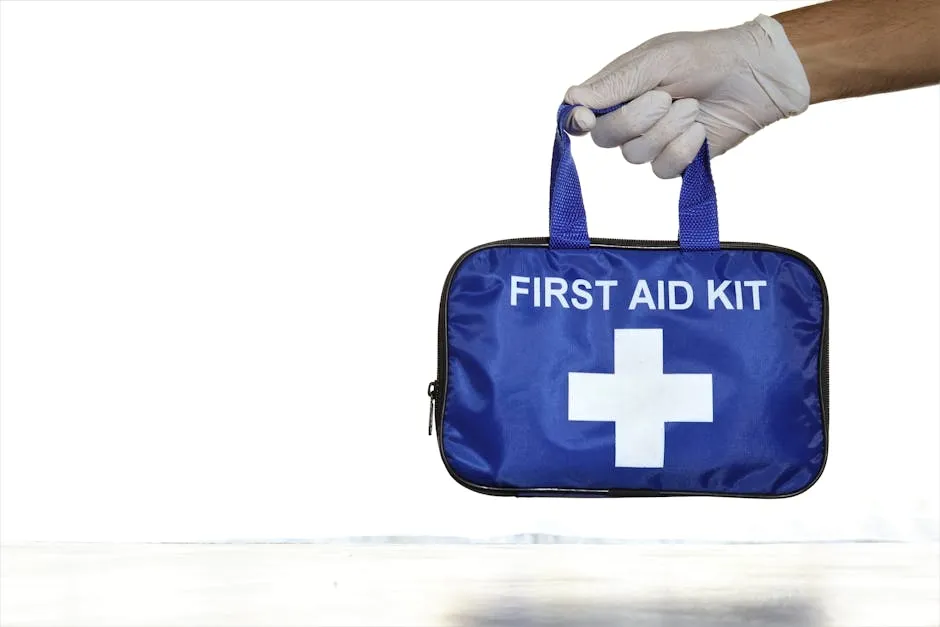
Conclusion
Canine vaccinations are not just a box to tick off your to-do list; they’re a lifeline for your dog’s health. By protecting against dangerous diseases, vaccinations help ensure your pup lives a long, happy life. They also play a critical role in public health, preventing the spread of diseases that can affect not only dogs but humans too.
As a responsible dog owner, staying informed and proactive about vaccinations is essential. Consult your veterinarian for personalized advice and adjust your pup’s vaccination schedule as needed. Remember, an ounce of prevention is worth a pound of cure—so keep those vaccinations up to date and enjoy every moment with your furry friend!

FAQs
What vaccines do dogs really need?
Dogs need core vaccines, including distemper, parvovirus, adenovirus, and rabies. These vaccines protect against serious, often deadly diseases. Non-core vaccines may be recommended based on lifestyle and environment.
How often should dogs be vaccinated?
Puppies typically receive their first vaccinations at 6-8 weeks, followed by boosters every 2-4 weeks until they are about 16 weeks old. Adult dogs should receive booster shots every 1-3 years, depending on the vaccine.
Are there risks to vaccinating my pet?
Yes, like any medical procedure, vaccinations can have side effects. Mild reactions may include soreness at the injection site or mild lethargy. Serious reactions are rare but can occur. Always monitor your dog and consult your vet if you notice anything unusual.
Is it too late to vaccinate my dog?
No, it’s never too late! If your dog hasn’t been vaccinated, consult your veterinarian. They can create a vaccination plan tailored to your dog’s age and health status.
Can I vaccinate my dog myself?
While some vaccines are available for home administration, it’s best to have your dog vaccinated by a veterinarian. They can ensure proper administration and monitor for any adverse reactions. Plus, it’s a great opportunity for a health check-up!
Understanding canine vaccinations and their importance is crucial for every dog owner. Canine Vaccinations
And while you’re making sure your dog is healthy, don’t forget about their comfort! Consider investing in a Dog Bed with Memory Foam for those well-deserved naps! Your pup will thank you with all the snuggles!
Please let us know what you think about our content by leaving a comment down below!
Thank you for reading till here 🙂
All images from Pexels

